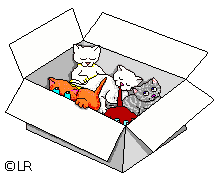Tip 1
You have got a beautiful queen and want to have a litter with her.
The most important is the health.
- Is the female at least 10 months old ? In general this is the age at
which one shall start with breeding with the queen. It is sometimes
possible that a queen might be mated with an earlier age, but this is due
to medical reasons, and your veterinarian should have inspected the queen
first and must recommend an earlier mating - such reasons might be f.e.
that the female is coming into heat quite frequently within a very short
time period.
- Is your female large and robust enough ? A female should have at least
a weight between 3,5 to 4 kilos, and should be well developed and should
have a solid bone structure. Contact your veterinarian under any
circumstances.
Contact also your club, which rules do apply for females.
The mere desire to have little kittens is not a good start for breeding !
Tip 2
You will need a stud male. Either you have already a male at home
or you will have to mate your female with a stud male outside of your
cattery. Get all necessary information about the stud male, the best is to
contact your own club.
- The stud male shall inherit good traits (f.e. no genetic defects).
- The stud male must be of healthy constitution (f.e. must have all
necessary vaccinations and tests).
- The lines (those are the cattery names you'll find in the pedigree of
the stud) shall harmonize with the lines of your queen.
Contact first your own club and ask first, which rules do apply for stud
males.
The next stud male just close to where you live might not be always the
best male !
Tip 3
Normally you have to pay a mating fee to the owner of the stud
male. This mating fee varies from breed to breed, depends also on the titles
a stud male might have, and differs quite a lot in the height of the price,
sometimes between 300.-€ and 700.-€,
but can be also higher.
Make a clear contract with the owner of the stud male, we recommend
to make a written contract:
- How high is the mating fee ?
- When does the mating fee have to be paid ? After a successful mating,
or in advance, etc.
- Which vaccinations, tests are required for your female, and how many
weeks old are they required to be ?
- How often do you have the possibility to come for another mating, if
the 1st mating was unsuccessful ? A serious breeder will permit you to
come at least 2 times more for another mating with the same queen, or will
refund the mating fee partly.
Do not make any arrangements with breeders, whom you do not really know
for a long time, that you will exchange a kitten instead of the mating fee,
either for free or for a lower price. You will avoid a lot of troubles.
If you absolutely think that you must make such an arrangement, separate the
arrangement for the mating clearly from the arrangement that the owner of
the stud male will have the first choice of a kitten instead of his mating
fee. Make two separate contracts, one contract about the mating and the fee
(pay the mating fee in any case), and one contract about the kitten the
owner of the stud male shall get from your litter (make a clear and written
contract with very clear conditions).
Tip 4
You need a cattery name, under which your kittens will be
registered.
-
Apply for a cattery name at your own club before you plan to have your
1st litter.
- In our clubs cattery names are permitted to be 17 characters long,
special signs and punctuation signs included.
- You may choose the cattery name by your own, but make sure not to
choose any familiar name, mostly those names are already occupied by other
breeders.
- Please note also that all your kittens planned in future will be
registered under this cattery name, you may not change the cattery name or
get a new one.
- As cattery names will be registered Fife wide, they need to be
unique. You can check on the
FIFe-website
the already used names.
The cattery name shall be a well sounding name which can easily be
remembered.

Tip 5
A female is pregnant between 63 and 65 days in average.
- Note the date of mating and write it down, thus you'll be able to
calculate the approximate day of birth.
- Make all necessary arrangements in good time, that your female can
deliver her kittens with confidence, such as a kitten box, clean blankets
and towels, and a sufficient warm surrounding.
- Do not become hectic or nervous, if the queen does not deliver her
kittens on the 65th day, do not drag her to the veterinarian
unnecessarily - it might happen that queens give birth between the 68th
and 69th day. If the female appears to be healthy and in good mood, it is
no reason for panicking.
- During the pregnancy your female needs the best food you can get, she
needs a peaceful surrounding without any stress. Leave the female in that
environment which she is used to, do not be like a broody hen shielding
her kittens off from everything.
Mostly it can be seen approximately in the 4th week, if a queen is
pregnant, because the tits are coloured in a noticeable pink colour. So, you
have enough time to see if the female is pregnant or not, you must inspect
the tits every day, you do not see anything in the first 3 weeks. |
Tip 6
Mostly the day of birth announces itself in advance.
- The female starts to search for an appropriate accommodation for
giving birth, f.e. she likes to enter your wardrobe, she searches for a
whole, she gets evidently obtrusive and follow you wherever you go.
- Simply watch the behaviour of your queen and you will notice that
today is the day of birth.
- Also make an arrangement with your veterinarian, just in case of
emergency, that he can come to your home in time. Such cases of emergency
are quite seldom, if your queen is healthy and robust and is kept in good
environment.
Do not panic, because you have read so much in the literature and have
heard so much from other breeders.
Do not become hectic and do not panic when your queen is giving birth,
your queen knows very well by her nature what to do.

Tip 7
Announce the litter to your club with the appropriate age.
- Announce the litter approx. with 4 weeks to your club, your club has a
litter announcement.
'Unlicensed breeding' that does not pay, thus the fees for the pedigrees
are too low.
- You are only permitted to place cats, - kittens as well
as adult cats, this is also valid for neuters - with a pedigree.
The pedigree is like an official document of birth.
- If you are uncertain about any colours or patterns of the kittens
contact the breeding council of your club - it is their task to help you
with colour determination, and your breeding council also has the
necessary experience to do so.
Thus you can be sure that your kittens will get their pedigrees in time
and will be included in the kitten corner.
Also notice that you can apply to include a breeding restriction on the
pedigree of the kitten. Mark such a restriction on the formular for the
litter announcement.
Tip 8
Do not place kittens before they are 14 weeks of age.
All that is based on very good reasons:
- Thus it will be guaranteed that kittens will have all their
vaccinations completed and will be fully protected (complete vaccination
means 1st and 2nd booster !) with an appropriate age and will not be too
young. The 1st booster alone of a vaccination is not sufficient to protect
the kitten, i.e. the 2nd booster after 4 weeks is absolutely necessary to
ensure that the full protection of a vaccination can come into effect.
- Many kittens still suckle with an age of 10 weeks, the longer the
better.
- Kittens with an age of 14 weeks are also robust enough, i.e. have an
appropriate weight. Kittens with less than 1,5 kilos are too small to be
placed !
Tip 9
- In our club kittens - as well as adult cats, this is
also valid for neuters, are only permitted to be placed when having a
health certificate, which must be issued and signed by an approved
veterinarian.
The easiest way to get the health certificate is to ask your veterinarian
to issue the certificate when you get your kittens vaccinated.
Why must our cats have a health certificate ?
This certificate is - like the pedigree itself - a certificate for a
certain quality that certain basic inspections have been made by the
veterinarian.
- The health certificate is also for your own protection, in case there
are things unclear or there are any troubles, if there are coming up
defects or faults later on.
- Do not hesitate that also the mandatory and recommended tests are
made, as indicated on the health certificate. Fatalism or hiding the head in
the sand is of no realistic use in the future and will damage the good
reputation of your cattery.
- It is not the main task of our club to control each for your steps or
to issue more and more regulations, our main task and purpose is to be the
consultant for your breeding programme and to assist you with the setup of
a proper breeding plan, thus avoiding genetic defects and problems in
your breeding programme. Do not hesitate to contact the breeding council.

Tip 10
Which documents do you need when placing a kitten or cats ?
- You must make a
written contract with the new owner for each kitten you sell or
place - this applies also for adult cats and neuters.
- Cats can only be placed or sold with their pedigree. Any other
arrangement with the new owner is not permitted and does not make any
sense, because the fee for a pedigree is too low to deduct or justify any
noticeable increasement of the sales price.
- You are only permitted to sell or place cats, kittens and also neuters
when they have a
health certificate
which must be given to the new owner. You keep a copy in order to be able
to answer questions and have your papers in hand in case of differences
with the new owner.
- We recommand that you microchip your kittens before you give them to
the new owner, so you can enhance the identification of the cats as well
as to avoid misuse.
- Cats are only permitted to be sold or placed when having the
complete vaccinations, mostly those vaccinations are indicated in a so
called vaccination passport. I.e. the new owner has the right to get this
vaccination passport, but please keep a copy for your own records.
|
